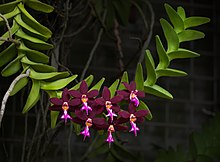Trichoglottis atropurpurea, the dark purple trichoglottis, is a species of orchid endemic to the Philippines.[2] This hot to warm growing epiphyte was first found growing in mangrove swamps in the islands of Biliran, Catanduanes, Mindanao (Agusan del Sur and Davao) and Polillo.[3] The plant shares the same appearance with T. philippinensis except for the rich dark color of the blooms and slight variation of the perianth.[4] This species was first described in 1877 by the German botanist Heinrich Gustav Reichenbach, an expert on the orchid family. At that time, thousands of newly discovered orchids were being sent back to Europe, and he was responsible for identifying, describing and classifying many of these new discoveries.[5]
| Dark purple trichoglottis | |
|---|---|

| |
| Trichoglottis atropurpurea, the Dark Purple Trichoglottis | |
| Scientific classification | |
| Kingdom: | Plantae |
| Clade: | Tracheophytes |
| Clade: | Angiosperms |
| Clade: | Monocots |
| Order: | Asparagales |
| Family: | Orchidaceae |
| Subfamily: | Epidendroideae |
| Genus: | Trichoglottis |
| Species: | T. atropurpurea
|
| Binomial name | |
| Trichoglottis atropurpurea | |

| |
| distribution of Trichoglottis atropurpurea | |
| Synonyms[2] | |
| |
Description
editTrichoglottis atropurpurea is a fairly large epiphytic species of orchid, with stems reaching 30 to 60 cm (12 to 24 in) long. Fleshy white roots grow out of the stems which are leafy towards the tip. The leaves, which overlap and semi-clasp the stem are oblong or oblong-ovate and slightly keeled. They are 3 to 8 cm (1.2 to 3.1 in) long and 2.5 to 4 cm (1.0 to 1.6 in) wide. The inflorescence grows from the leaf axil and bears one or two fleshy, fragrant flowers, up to 4.5 cm (1.8 in) in diameter. The five tepals are some shade of dark reddish-purple, and the hairy, lobed, lip is white with purple streaks and a splash of yellow near the base.[6]
Gallery
edit- Photos of Trichoglottis atropurpurea
-
Trichoglottis atropurpurea
flower -
Trichoglottis atropurpurea
habitus
References
edit- ^ "Trichoglottis atropurpurea". International Plant Names Index (IPNI). Royal Botanic Gardens, Kew; Harvard University Herbaria & Libraries; Australian National Botanic Gardens. Retrieved 10 December 2016.
- ^ a b "World Checklist of Selected Plant Families". Royal Botanic Gardens, Kew. Retrieved 2014-12-12.
- ^ Williams, Louis Otho (1938). "Philippine Trichoglottis". The Philippine Journal of Science. 65: 391. Retrieved 12 December 2014.
- ^ Ames, Oakes (April 5, 1922). Orchidaceae: illustrations and studies of the family Orchidaceae (7 ed.). Ames Botanical Laboratory, North Easton, Massachusetts: The Merry Mount Press. p. 136. Retrieved 10 December 2016.
- ^ Reinikka, M. A. A History of the Orchid, p. 215, Timber Press, Oregon, 1995
- ^ "Trichoglottis atropurpurea". Internet Orchid Species Photo Encyclopedia. orchidspecies.com. Retrieved 1 October 2020.
External links
editMedia related to Trichoglottis atropurpurea at Wikimedia Commons